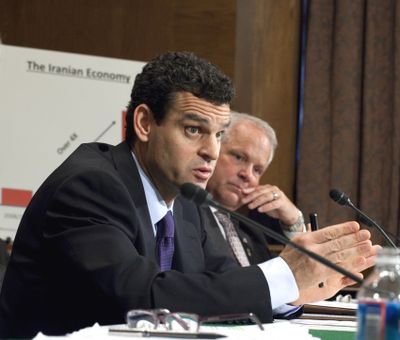U.S. may sanction Iran bank
White House weighing response to alleged plot

WASHINGTON – The Obama administration said it was “actively” considering sanctioning Iran’s central bank in retaliation for an alleged Iranian assassination plot, a move that could severely damage Iran’s economy and potentially provoke a strong response from Tehran.
David Cohen, the Treasury undersecretary for terrorism and financial intelligence, told the Senate Banking Committee that officials were “looking very actively” at such a step and might carry it out if other nations could be persuaded to follow suit.
The blacklisting is the first specific step the administration has identified as a possible response to the alleged plot to assassinate Saudi Arabia’s envoy to the United States and to attack embassies in the U.S. and Argentina.
Such sanctions would aim to isolate the Bank Markazi, or central bank, from the world economic system by barring any firm that deals with it from doing business with U.S. financial institutions. That would make it far more difficult for Iran to sell crude oil, which funds much of the government’s activities.
Some Iranian officials have warned that they would look on such a move as an act of war.
The sanctions would probably be effective, however, only if other world powers joined in. And the administration would have to overcome arguments that the action would harm ordinary Iranians and damage the oil markets.
Cohen, who is in charge of U.S. sanctions on Iran, told the committee that if other countries joined in the blacklisting, it “could further isolate the central bank of Iran, with a potentially powerful impact on Iran.”
President Barack Obama said Thursday that he wasn’t sure if top Iranian leaders personally knew of the plot to kill the Saudi ambassador, but he said they should be held accountable anyway.
“Even if at the highest levels there was no detailed operational knowledge,” Obama said, “there has to be accountability with respect to anybody in the Iranian government engaging in this kind of activity.”
Obama said Iran must “answer to the international community” for anyone in its government engaged in terrorist activity.
Both the George W. Bush administration and the Obama administration have looked at sanctions on the central bank in recent years, even as a series of economic strictures have been placed on Tehran in an unsuccessful attempt to persuade the regime to abandon its suspected nuclear weapons program.
But officials have been hesitant to take a major step against the central bank, in part because of a reluctance to damage financial institutions that are essential to national economies.
In the aftermath of the alleged assassination plot, however, the administration is searching for another way to punish a regime that has seen more and more curbs on its ties to the world financial system. And the administration is under growing pressure from Congress, which has legislation in both houses, backed by large numbers of lawmakers, calling for sanctions on the bank.